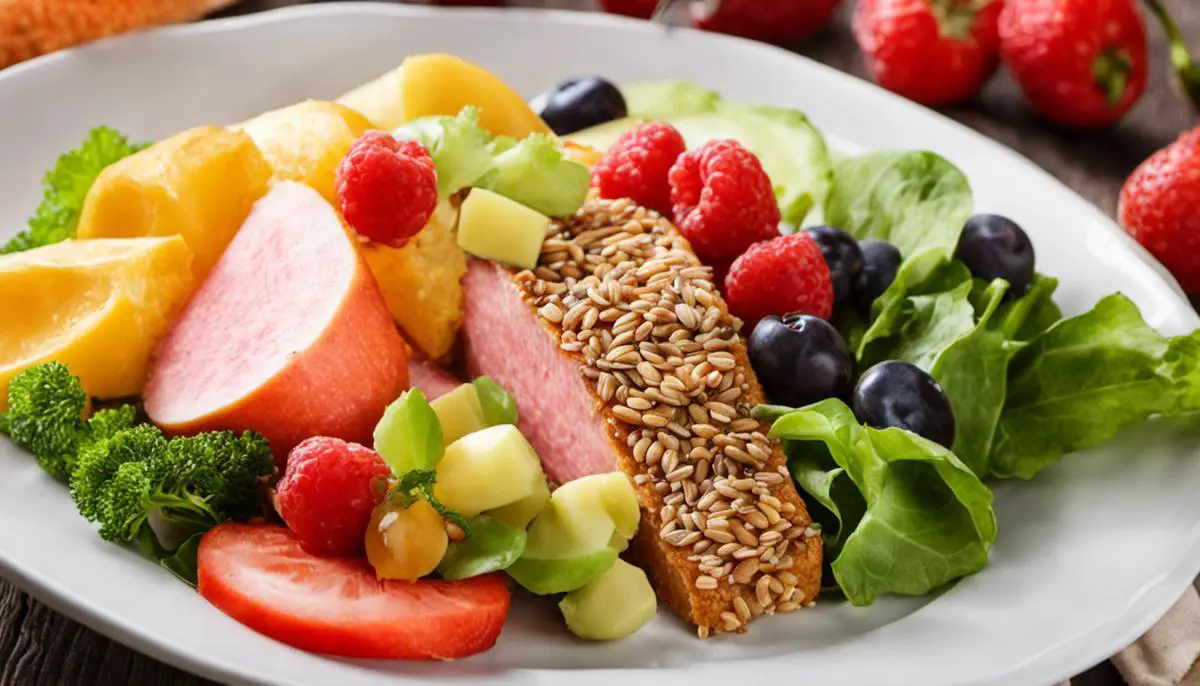Gout, a common yet oftentimes misunderstood condition, presents itself as an acute form of arthritis typically affecting the feet, inducing intense pain and discomfort. Rooted in high levels of uric acid in the bloodstream, the disease occurs when these acids crystallize and become lodged in the joints and soft tissues. Factors like diet and lifestyle behavior significantly contribute towards one’s susceptibility to gout. The following discussion aims to illuminate the critical aspects of gout, the role diet plays in its prevention, and various home remedies that can serve as a preventive measure against this debilitating ailment.
Understanding Gout
Understanding Gout: A Brief Overview
Gout is a type of arthritis caused by the accumulation of uric acid crystals in the joints. This build-up typically occurs when the body has high uric acid levels, a condition known as hyperuricemia. The excess uric acid forms sharp, needle-like crystals in a joint or the surrounding tissue, causing severe pain, inflammation, and sometimes, lumps under the skin called tophi.
Main Causes of Gout
The primary cause of gout comes from a diet rich in purines, substances found commonly in certain foods and drinks. Foods high in purines include organ meats, beef, pork, lamb, oily fish, and shellfish. Alcohol, especially beer, and drinks sweetened with fructose are also high in purines. In some cases, gout can occur from the body naturally producing more uric acid, kidney malfunction reducing uric acid elimination, or a combination of both.
The Role of Diet and Lifestyle in Gout Formation
Dietary habits and lifestyle play a critical role in the development of gout. Overeating and obesity can increase the risk of developing the condition. Similarly, excessive alcohol consumption, especially beer, can elevate uric acid levels leading to gout. Furthermore, inactive or sedentary lifestyle behaviors can contribute to obesity and, consequently, a higher gout risk.
Early Detection of Gout Through Symptoms
Gout symptoms often come in the form of attacks. These attacks are often sudden and happen at night in most cases. Symptoms include intense joint pain, usually in the big toe, that could last for a few days to a few weeks, lingering discomfort, inflammation, and redness in the affected area. Chronic gout could lead to advanced joint damage and a limited range of motion.
Gout Prevention Through Home Remedies
While gout is a medical condition that requires professional health intervention, some home remedies can help prevent gout onset and soothe an ongoing attack. A well-balanced diet low in purines can help manage gout and reduce the risk of attacks. Regular exercise and maintaining a healthy weight can also ward off gout attacks by keeping uric acid levels in check. Other prevention measures include staying well-hydrated, avoiding sugary drinks and alcohol, and taking vitamin C to help reduce uric acid levels.
If you are concerned about gout, know the risk factors, symptoms, and how it can be managed to reduce the risk and impact on your life. You are encouraged to seek medical advice if you experience gout symptoms or are at high risk due to obesity, alcohol use, or a diet high in purines.

Role of Diet in Gout Prevention
The Impact of Diet on Gout
Gout is a type of arthritis characterized by severe pain, redness, and swelling in joints, particularly at the base of the big toe. Gout generally occurs when there is too much uric acid in the body, leading to the formation of hard crystals in your joints. Your diet plays a crucial role in maintaining your uric acid levels. Consuming certain foods increases uric acid, increasing the chances of developing gout. On the other hand, certain diets can prevent gout by reducing uric acid levels.
Foods That Increase Uric Acid
Our bodies produce uric acid naturally when breaking down purines, which are present in many foods we consume daily. Certain foods are high in purines and, when consumed excessively, can raise uric acid levels. These include organ meats such as liver, heart and kidneys, shellfish, bacon, turkey, veal, venison, and alcoholic beverages, especially beer. Fructose-sweetened drinks and foods high in yeast also augment uric acid production.
Diets That Aid in Gout Prevention
Though it might seem challenging, modifying your diet can be an effective way to reduce your risk of gout. A gout-preventive diet doesn’t mean cutting out all high-purine foods but introducing dietary balance.
A gout-friendly diet should include complex carbohydrates like fruits, vegetables, and whole grains, which are low in purines. Lean proteins, such as chicken, nuts, and tofu, are also beneficial as they are lower in purines than red meat and some types of seafood. Ensuring a good intake of dairy products helps counteract uric acid levels and reduce gout risk. It’s also essential to maintain a healthy body weight, as obesity increases uric acid levels.
Planning and Preparing Gout-Friendly Meals
In adopting a gout-friendly diet, it’s crucial to plan meals in advance. Ideally, your diet should be based around staple foods that are low in purines, and consume high-purine foods in moderation.
For breakfast, opt for oatmeal with skimmed milk and fruits, which can include bananas and apples. For lunch, salads with plenty of
leafy greens and a small portion of lean chicken are a great choice. Dinner could include a portion of grilled salmon paired with a side of mixed vegetables.
Avoid overindulging in alcohol and beer, which are high in purines, and try to eliminate sugary soft drinks from your diet. Prefer water, unsweetened tea or coffee, and soda water for hydration, and maintain a healthy fluid intake that keeps your kidney functioning optimally and aids in flushing out extra uric acid from your body.
Understanding and following a diet that helps regulate uric acid levels can significantly reduce the risk of gout. However, changing dietary habits alone might not completely prevent gout for everyone. If you have gout, work with your healthcare provider or a dietitian to create a diet plan tailored to your needs.

Home Remedies for Gout Prevention
Understanding Gout and Its Natural Remedies
Gout is a type of arthritis that results from an overabundance of uric acid in the bloodstream. It commonly affects the joint at the base of the big toe, leading to sudden and severe bouts of pain, redness, and swelling. While over-the-counter medications are used to treat gout, natural remedies can also assist in gout prevention.
Hydration as a Prevention Method
One of the simplest and most effective ways to prevent gout is simply by staying hydrated. Drinking plenty of water can help the kidneys flush out excess uric acid, reducing the risk of gout. Aim for at least eight glasses of water each day.
Dietary Changes for Gout Prevention
Certain foods can trigger gout attacks by raising uric acid levels. These foods contain high levels of purines, which are metabolized into uric acid in the body. To prevent gout, avoid foods such as organ meats, red meats, seafood, and beer, which are high in purines. On the other hand, certain foods can help mitigate the risk of gout. Cherries, for instance, have been shown to have gout-fighting properties due to their high antioxidant levels.
Herbs and Spices with Anti-Gout Properties
Certain herbs and spices have anti-inflammatory properties that can help in gout prevention. Ginger and turmeric, for example, have been found to inhibit the production of chemicals that cause inflammation and pain in the body. Additionally, they have been used in traditional medicine to treat arthritis and related conditions.
Natural Supplements for Gout
Several natural supplements have been used to aid in gout prevention. These include Vitamin C, which may reduce blood uric acid levels, and fish oil, which can reduce inflammation. However, as with any supplement, always consult with a healthcare professional before starting a new treatment regimen.
Lifestyle Changes for Gout Prevention
Engaging in regular physical activity and maintaining a healthy weight can greatly reduce the risk of gout. Excessive weight puts unnecessary strain on the joints and can lead to hyperuricemia, a pre-condition to gout. Cutting back on alcohol and sugary drinks, which can increase uric acid levels, can also be beneficial.
In conclusion
gout prevention involves a combination of staying hydrated, making dietary changes, using particular herbs and spices, taking certain supplements, and adopting healthy lifestyle changes. Each of these methods can contribute to a lowered uric acid level, reducing the risk of a gout attack.

Photo by anniespratt on Unsplash
While there remain numerous complex and intricately linked aspects of gout still to be explored, a clear understanding of the condition serves as a solid foundation. By maintaining a diet rich in essential nutrients and low in purines, one can significantly reduce their risk of developing gout. Furthermore, by understanding and taking advantage of natural remedies that bolster the body’s defenses, it is possible to safeguard against this painful disease. The ultimate key to prevention lies in awareness, commitment, and the persistent practice of healthier lifestyle choices.
